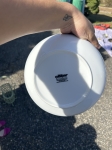Credit Card/Collections Dilemma
Don’t call the number on the collections letter. Aside from that, do this:
There are websites, Defeat Pressler and Pressler.
P & P is an outfit that used to buy old debt and then try to collect. They are now out of business.
The various websites reflect how to challenge them if you are sued. The backgrounds to these situations and yours are different but the strategy would be the same: have them produce the application for the card, then challenge it.
If the above recommendation of contacting the 3 credit bureaus doesn't work, then go to the P & P sites for suggestions.
I am not an attorney.
Thanks -- she is taking steps, but is making no progress with the card-issuing bank (which sent the supposed charge to a collections agency). She is asking for a validation letter from them to somehow prove the charge is hers, though I don't quite know how that could be done. And how can SHE prove it is not?
How long ago did the charge appear? If she's frozen her credit (sorry, it wasn't clear from your first post), a letter to that effect from one of the reporting agencies should support her case, which she should make in person at the issuing bank, if possible.
She should also request copies of her credit report from all three bureaus and make sure that there aren't more fraudulent cards out there.
When criminals do illegal credit cards, they usually do large charges. They may do an initial small charge to "validate" the account, but the point is to maximize "profit." This seems more like some weird error than a criminal attempt.
The application info would help. When a charge is not paid, multiple attempts are made to reach the customer by mail. Did they have the wrong address? Does the application show that? Yet, when its collection time they managed to track her correct address. Which is possible because collection agencies would use resources to find that a lazy credit issuer would not.
Having a fake application address would help in showing identity theft. But, if the address was correct, why didn't the late payment mailings get to her?
RobB said:
Don’t call the number on the collections letter. Aside from that, do this:
I agree. Don't call the collection agency. Do send a certified letter disputing the validity of the card.
BG9 said:
When criminals do illegal credit cards, they usually do large charges. They may do an initial small charge to "validate" the account, but the point is to maximize "profit." This seems more like some weird error than a criminal attempt.
The application info would help. When a charge is not paid, multiple attempts are made to reach the customer by mail. Did they have the wrong address? Does the application show that? Yet, when its collection time they managed to track her correct address. Which is possible because collection agencies would use resources to find that a lazy credit issuer would not.
Having a fake application address would help in showing identity theft. But, if the address was correct, why didn't the late payment mailings get to her?
Does the bank's application records also indicate a false S.S. number?
Do the bank's application records also indicate a false S.S. number?
That's a good question, but they say she must provide her ss# for them to ascertain, which she's reluctant to do. Seems they could just give her the last 4 of the number on record so we could break this logjam.
I agree about the amount being suspiciously small for a fraudster. Also, the card was supposedly obtained in December and this is the only charge -- so, maybe an error, but hard to get to the bottom.
Thanks for the info/advice!
Could the whole debt collection process be the scam, to get her to give both money and security information?
Jasmo said:
Could the whole debt collection process be the scam, to get her to give both money and security information?
That would be interesting... Most likely, the communications from the collection company was preceded by letters and/or phone contact from the bank.
Good speculation. She doesn't recall receiving an original bill from the retailer (it's supposedly a store card) but admits she may have thrown something out as junk mail, without opening.
Potentially telling fact? -- her address on the collections letter was organized in a way she never uses -- like if you always enter your address as 123 Obama Street, Apt 7A and then get a piece of mail at 123 Barack Hussein Obama Street, #A7. Is this fishy?
My address has sometimes been written wrong even when I put it right on an application....
for example, it will say Avenue instead of Road.....
some times software auto corrects if it doesn't recognize the format.
I think (fuzzy memory on this) if you formally claim the charges/debt is not yours then the collection agency is required to prove it or they must stop contacting you.
yahooyahoo said:
I think (fuzzy memory on this) if you formally claim the charges/debt is not yours then the collection agency is required to prove it or they must stop contacting you.
The problem is the credit rating.
The credit rating system is biased towards business, not consumers. You have to "prove" your innocence. You can dispute but that may not prove innocence.
With a dispute you can have your comment added describing why you dispute but your credit rating still remains lowered.
For Sale
Free Items
Sponsored Business
Promote your business here - Businesses get highlighted throughout the site and you can add a deal.























Daughter is being pursued for small debt on a credit card which she never had. When you see a fraudulent charge on a credit card that you do have/use, there is a process for disputing -- but when you are not a cardholder, and cannot even provide an account number, it becomes very difficult. (She knows not to provide any more personal info beyond what is in the collections letter.)
Anyone deal with something like this? How do you break the logjam?
Also disturbing that someone could get a card issued in her name with her credit frozen. She has disputed this with the credit bureaus and asked how this could have occurred.